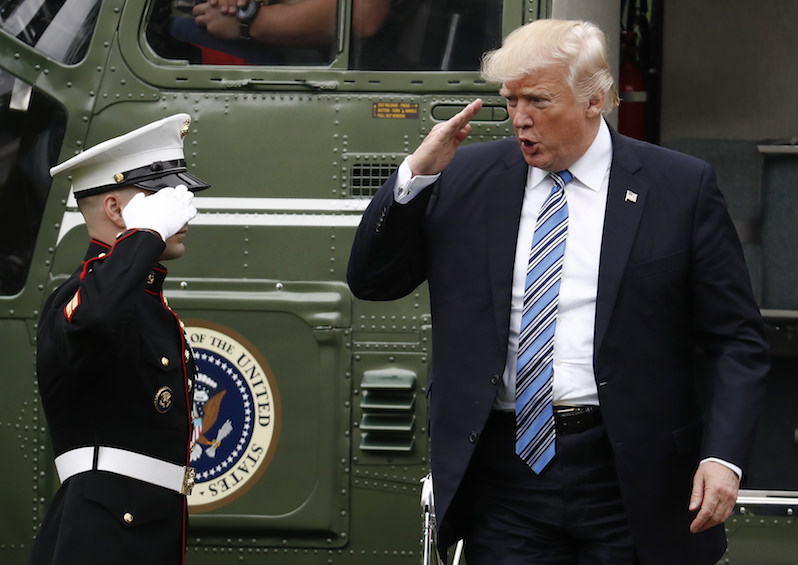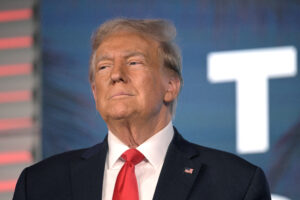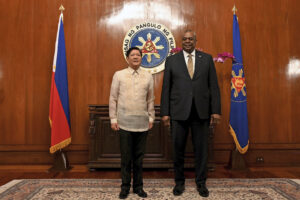Trump Shows His Hand in Firing Comey
More indicators of the president’s march toward a police state and the destruction of democracy are evident in his ouster of the FBI director. President Donald Trump. (Carolyn Kaster / AP)
President Donald Trump. (Carolyn Kaster / AP)
Editor’s note: The story of America is the story of immigrants. But since Donald Trump became president, the immigration issue has become a humanitarian crisis in the United States. Truthdig political correspondent Bill Boyarsky investigates the impact of Trump’s anti-immigrant racism on Los Angeles—home to 1 million undocumented immigrants—in this ongoing series for Truthdig called “Demonizing the City of Angels.” You can read all of Boyarsky’s stories in the series here.
There is a dangerous parallel between President Trump’s firing of James Comey and his efforts to arrest and deport undocumented immigrants and limit immigration from Muslim-majority countries.
Both actions show contempt for democracy and its institutions and push the United States farther down the road to authoritarian government. On immigration, Trump is trying to undermine the power of the courts. By firing Comey, the president is threatening the independence of federal prosecutors and agencies to enforce the law without fear of political interference, whether their target is a kidnapper or president of the United States.
The thought of political interference occurred to me when, as FBI director, Comey was asked by Trump whether he was being investigated in the probe of alleged Kremlin attempts to penetrate the Trump campaign in 2016. According to Trump, Comey said no.
Whether you believe Trump’s account depends on your gullibility. What’s important is that in asking the question of Comey, who was heading the investigation, Trump may have crossed a line and committed the crime of obstruction of justice.
Interestingly, one of Trump’s accomplices in the Comey firing was Attorney General Jeff Sessions, an architect of Trump’s attempted power grab. Sessions was supposed to have recused himself from the Russian investigation, but he, along with Homeland Security Secretary John Kelly, are leading Trump’s campaign against immigrants, which features attacks on the courts.
In January, Trump issued an executive order that would have banned people from seven Muslim-majority countries from entering the United States for 90 days. It also would have halted admission of refugees for 120 days. That order was overturned by a federal court. Federal judges also threw out a new and modified order. When a judge voided his travel ban, Trump tweeted, “Just cannot believe a judge would put our country in such peril. If something happens blame him and court system. People pouring in. Bad!”
Trump also attacked the courts when a federal judge overturned his executive order withdrawing federal aid to “sanctuary jurisdictions”—states, counties and cities that limit the assistance local law enforcement are compelled to give to federal immigration officers.
His executive orders on immigration and sanctuary jurisdictions had much in common with the Comey firing. All were hastily and poorly drawn efforts to assert the authority of the executive branch. In the sanctuary case, Judge William Orrick, in overturning Trump, wrote, “The order’s attempt to place new conditions on federal funds is an improper attempt to wield Congress’s exclusive spending power and is a violation of the Constitution’s separation-of-powers principles.”
Trump’s actions in firing Comey and perhaps attempting to thwart the Russian investigation are more dangerous to democracy than his practice of heaping scorn on the courts in the immigration and sanctuary cases.
In a valuable article on Lawfare’s blog posted May 11, professor Bob Bauer of the New York University School of Law, who was White House counsel to President Obama, explained how Trump’s firing of Comey, who headed the Russian investigation, violated norms or standards governing federal criminal prosecutions.
He zeroed in on Lester Holt’s NBC interview, also from May 11, with Trump, in which the president said he asked the FBI director whether he was being investigated and Comey replied in the negative. Bauer said that in so doing, Trump had raised “the question of whether the president has now made himself the potential subject of an investigation into obstruction of justice.”Bauer wrote:
It is well-nigh incomprehensible that the president would call the Federal Bureau of Investigation to inquire about any pending criminal investigation. The norm is the generally and well-understood one: that the president, while responsible for the leadership of the department and certainly able to dictate legal policy, including criminal justice policy, should refrain from any attempt to influence criminal enforcement decisions … we would not want the most senior political figure in government deciding upon whom to visit the cost and potential ruin of criminal prosecution.
In this case, Trump took a step further and inquired about the possibility that he, in his personal capacity, was subject to investigation. If the norm as applied more generally holds at all in criminal cases, it applies with special force in a case where the president would intervene in the criminal justice process in his own self-interest or the interests of political supporters, friends, family members or allies.
Unfortunately, Republicans are in control of the House and Senate, and there isn’t much chance their leaders will stand up to Trump. That leaves the investigation into potential Kremlin interference with the 2016 election up to minority Democrats, a few stand-up Republicans and federal prosecutors and FBI agents who are, hopefully, deep into an investigation of the case.
Progressives are skeptical of the FBI. But these investigations have a way of taking on a momentum of their own. Once law enforcement starts rolling, it can be hard to stop. Trump staff members may reconsider their loyalty when an agent shows up to ask questions about the 2016 campaign, gathering evidence for an obstruction-of-justice case. Were I that staff member, my first reaction would be to call a lawyer, who would probably advise me to turn on my superiors if I had any incriminating evidence against them.
In the end, it may be federal agents and prosecutors, taking their cases to federal courts, who will stop Trump’s march toward a police state and preserve our democracy. He’s done much to demean the FBI with his firing of Comey and federal prosecutors by dismissing most of the nation’s U.S. attorneys. It would be satisfying irony if they give him what he deserves.
Your support matters…Independent journalism is under threat and overshadowed by heavily funded mainstream media.
You can help level the playing field. Become a member.
Your tax-deductible contribution keeps us digging beneath the headlines to give you thought-provoking, investigative reporting and analysis that unearths what's really happening- without compromise.
Give today to support our courageous, independent journalists.






You need to be a supporter to comment.
There are currently no responses to this article.
Be the first to respond.